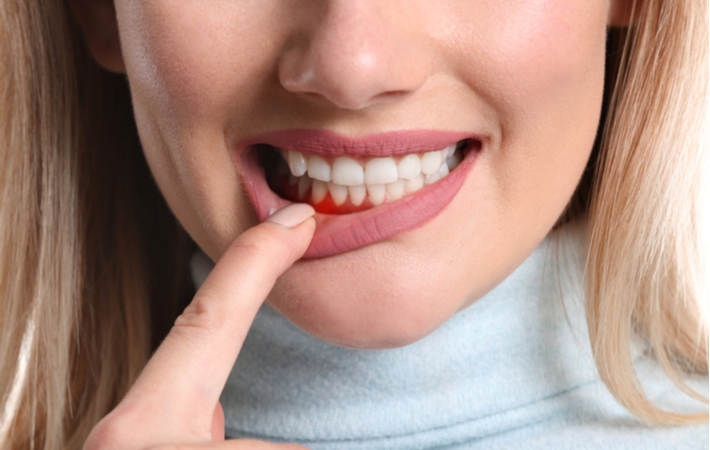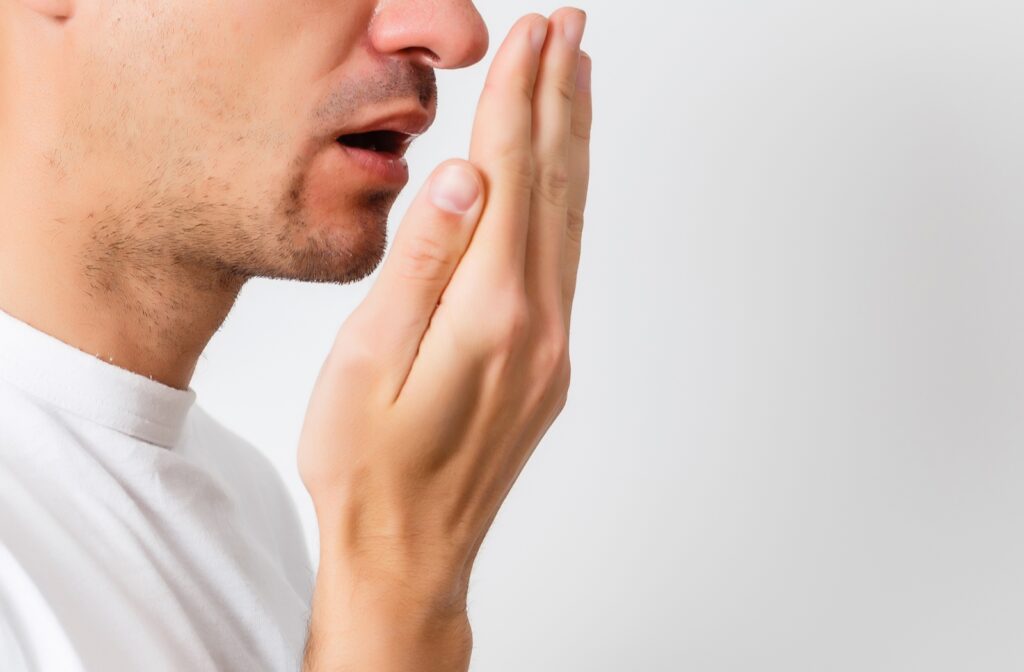Having bad breath is one of those things that isn’t necessarily as result of poor brushing. Sure, eating certain foods, drinking coffee, or forgetting to brush your teeth can all leave you with an unpleasant odour in your mouth. But why do some people have bad breath even after brushing?
Brushing and flossing every day is your first step to eliminating bad breath. But when problems persist, it’s time to visit the dentist. Regular dental exams and cleanings are essential for identifying odour problems before they affect your life.
Let’s explore some root causes of bad breath that lingers even after brushing. If you’re brushing like a mad person each morning and still notice an unpleasant smell, it’s time to book an appointment with Dr. Blair at Palermo Village Dental.
Do You Have Bad Breath?
Bad breath is quite simply a foul odour that comes from your mouth. This is also known as halitosis. Bad breath can be embarrassing and might be noticed by people around you.
How can you tell if you have bad breath? If you’ve got a bad taste in your mouth or notice a funny smell when you speak or breathe, it can indicate you have bad breath.
It’s normal for most people to experience halitosis at some point during their lifetime. Eating food with strong flavours, like garlic or onion, can leave you with bad breath. In a healthy mouth, these orders can be eliminated with proper oral care.
Reasons for Having Bad Breath
Most of us know that certain foods are going to give us bad breath. Think onions, garlic, horseradish, spicy foods, or strongly flavoured fish. But these odours should be temporary. After brushing and flossing, the food smells should be eliminated.
Sometimes oils from these foods enter your bloodstream and travel to your lungs. This can affect the smell of your breath. Normally, this effect should pass within 72 hours.
There could be other underlying causes of chronic bad breath.
1. Poor Personal Oral Care
Brushing and flossing daily is essential for fresh breath. Inadequate oral hygiene allows food particles and bacteria to accumulate, leading to odour. To prevent bad breath:
- Brush for 2-3 minutes twice a day to prevent bacterial build-up
- Floss daily to remove food debris
- Use antibacterial mouthwash for extra freshness
2. Lifestyle Choices
Smoking tobacco, be it cigarettes, cigars, or vapes, can give you perpetually bad breath. Smoking contributes to dry mouth, which also affects the smell of your breath. Not to mention the other health conditions associated with tobacco consumption, which may contribute to the way your breath smells.
Drinking alcohol in excess and smoking cannabis may also give you halitosis.
The best way to remedy bad breath from tobacco: stop smoking! Otherwise, try reducing tobacco consumption or trying these methods to eliminate smokers’ breath.
3. Dry Mouth
Your saliva is one of the leading killers of bacteria in your mouth. A healthy supply of saliva keeps your mouth clean and your breath neutral. Dry mouth is a condition that leads to insufficient saliva production.
Saliva also helps remove particles from between your teeth. Chronic dry mouth is a condition to be treated by your dentist. The causes of dry mouth include:
- Certain medications
- Alcohol
- Cannabis
- Breathing with your mouth open
- Dehydration
- Snoring
4. Mouth Infections
Is normal to experience bad breath after oral surgery. The natural healing process creates some unpleasant smells that should start to disappear as you fully recover. Surgical wounds and removed teeth are both exposed to infection.
Mouth sores and tooth decay may also produce bad breath. If you continue to experience halitosis after recovering from surgery or getting a filling, it’s a sign something is wrong. Contact our practice for follow-up.

5. Gum Disease
Gum disease occurs when your teeth and gums are not properly maintained. Also known as periodontal disease, this condition results from plaque hardening into tartar and forming pockets between your gums and your teeth.
These pockets are susceptible to bacterial invasions and the collection of food particles. Both of these things can lead to bad breath. Your best bet is to avoid gum disease by brushing regularly and seeing your dentist twice a year.
6. Sinus Conditions & Other Diseases
The smell of your breath can be affected by so many things. Conditions originating from your sinuses, nose, or throat can give you halitosis. Medical conditions concerning your lungs or air passageways may add a foul stench to your breath.
Some of the conditions that can contribute to bad breath include:
- Sinus infection
- Postnasal drainage
- Chronic bronchitis
- Respiratory system infection
- Kidney disease
- Liver disease
- Diabetes
- Sleep apnea
- Gastroesophageal reflux disorder
Get Your Freshest Smile
If you’re noticing bad breath, it might not be just a case of forgetting to brush. There could be factors beyond oral hygiene that contribute to your halitosis. When bad breath persists, time to book an appointment with your dentist to uncover the problem.
Complete our Healthy Mouth Assessment to get a baseline understanding of the condition of your mouth. Make sure to drink lots of water, keep up with oral hygiene at home, and always get regular cleanings at your dentist. The good news is that freshness usually conquers chronic bad breath with the right treatment.
So book an appointment today for your mintiest, freshest smile!




